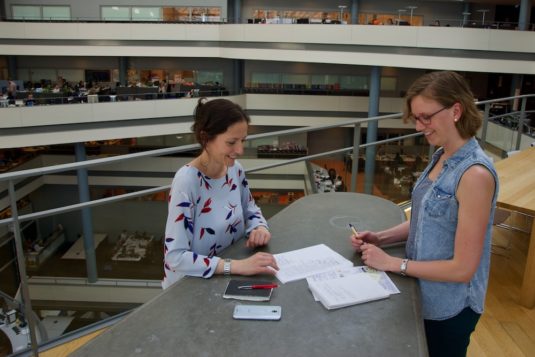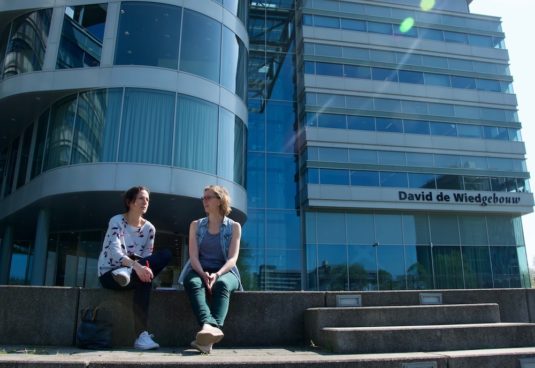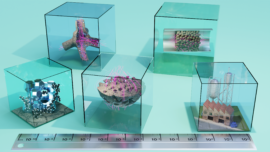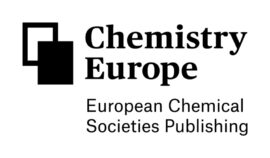Interview with MCEC’s Managing Director Emke Molnar
“I strongly believe in the power of meeting and connecting. An active encouragement of those meetings is required within MCEC, since our researchers’ different scientific backgrounds means that they do not ‘speak each other’s languages’. Plus, the physical distance between MCEC’s three participating universities can make it hard for them to come together. But in order for the program to be successful, members and students must get to know each other, hear each other’s stories, and find the common denominators. The lab tours and Annual Meetings facilitate this kind of exchange, and the focus of the MCEC Schools’ programs is also on the interdisciplinary exchange. It’s something I pay a lot of attention to, and I always try to make the meeting happen, without losing sight of the goals and outlines of the consortium.”

Mid-term
“Leading up to the mid-term evaluation in mid-2017, in January of that year the entire MCEC community came together for a three-day conference at Schiphol. My main goal was to allow the members of the Scientific Advisory Board [SAB] to experience for themselves what our program entails and where the true strength of the community comes into being. All of the input from students, members, MT, Supervisory Board [SB] and SAB then had to be brought together into a coherent piece that would give equal voice to all of their contributions. This was an intensive process, as I was to find out; one that required close collaboration between the PIs and a strong coordination on my part. But it was an exciting period, too, and fortunately all of the efforts were not in vain: after meeting with the NWO* evaluation committee in May of that year, we were granted funding for the second phase.”
“The investment in building a strong community must be genuine, and it must be continuous.”
Flywheel effect
“The NWO decision, and the confidence we have in our PhD training program, allowed us to rise to the challenge of applying for a Cofund. Not only would this potentially allow for more PhD students to enter the MCEC program, but the application would also bring into focus the suitable structure of the second phase. Who exactly would we need? What research lines would we utilise? How could we strengthen our research center’s existing collaborations? And how could we ensure that our students were eligible for a joint doctorate degree? These were just some of the themes we had no prior experience with, but I was convinced that we would succeed. And we were, indeed, awarded the Marie Skłodowska-Curie Cofund Grant. To me, it felt like a ‘flywheel effect’: a result that could only be achieved because of MCEC’s scientifically and organisationally well-founded research and education program.”
Chemergy
“Another example is the continuation, for at least five more years, of the Strategic Alliance between TU/e and UU: the so-called Joint Center for Chemergy Research. In this project, the collaboration between the groups of Bert Weckhuysen and Emiel Hensen will be intensified with the aim of strengthening the cohesion between the research line in Utrecht – biomass-based electrochemistry – and the research line in Eindhoven – inorganic electrochemistry. Scientifically, they relate to the areas in which MCEC has been investing.”
“I’ve always included members and students in those parts of the program that applied to their own scientific or personal development.”

Think tanks
“In recent years, several teams have functioned as ‘think tanks’ for myself and the MT*. The role of the MCEC tenure track Assistant Professors as team leaders is crucial to this, but the student representatives are also of immense value to us. A multidisciplinary consortium like ours needs the active involvement of the entire group, and I’ve always included members and students in the realisation of those parts of the program that applied to their own scientific or personal development, be it meetings or outreach activities. MCEC’s community consists of research groups and disciplines that, in this capacity, have never before worked together this intensively. Such a strong community can only emerge, grow and thrive by the grace of solid coordination and sufficient support. Successes don’t happen overnight: the investment in building a strong community must be genuine, and it must be continuous.”
“The NWO decision, and the confidence we have in our PhD training program, allowed us to rise to the challenge of applying for a Cofund.”
Support
“Naturally, MCEC is in part a virtual collaboration. This yields all kinds of advantages, but it also literally and figuratively creates distance. By regularly visiting the different groups at the three locations, by being present at all activities, by making sure both organisation and materials had a professional representation, and by investing in the personal relationships with members and PhD students, I hope I’ve managed to strengthen and support both management and community.”
Emke Molnar was appointed as Managing Director of MCEC at the very start of the program in 2013. In 2018, her activities will be taken over by Program Coordinator Nina Versteeg. On behalf of the entire MCEC Community, we wholeheartedly thank Emke for the invaluable work she’s done for our research program, and we wish her all success in her continued career.
*Netherlands Organisation for Scientific Research (NWO).

